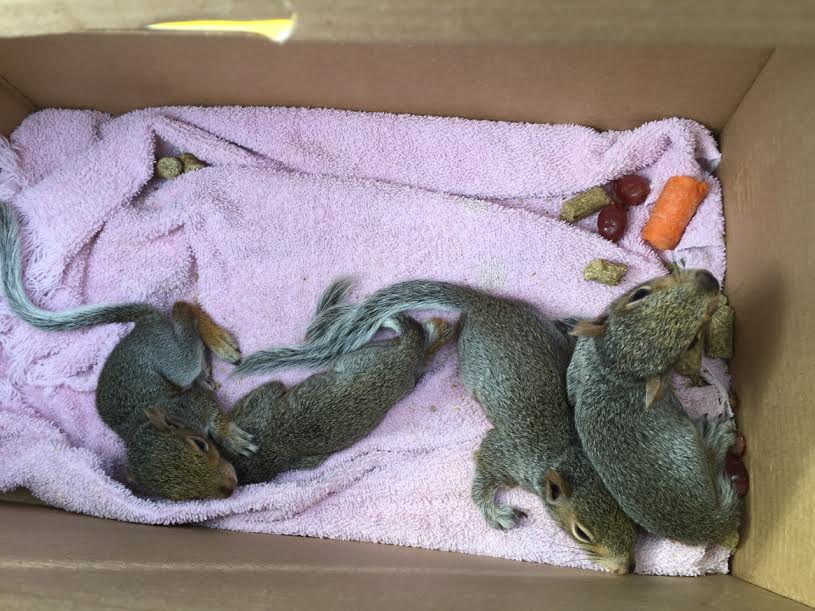Looking at video footage and photos from the aftermath of Hurricane Joaquin, one doesn’t immediately see the effect on animals, especially baby animals. But, just like people, many are uprooted from their homes and separated from their families.
In recent days, some 300 orphaned baby squirrels have been found along the coast of the Carolinas, and a number of them are headed to Western North Carolina to be hand-raised by wildlife rehabilitation specialists.
“Squirrels nest in crooks in trees,” says Nina Fischesser of both the Blue Ridge Wildlife Institute at Lees-McRae College and the Appalachian Wildlife Refuge. “The nests, made of sticks and leaves, are called dreys, and when these big storms come up, they can be blown right out of trees.”
Fischesser was traveling home to Banner Elk on Friday after picking up a dozen of the squirrel babies, each nestled in a Bojangles box, along with a few birds, including a great blue heron that had gotten stuck in the mud. Her first stop was Hickory — where, as luck would have it, a conference of wildlife rehabilitators is being held. Some of those participants will take this first batch of squirrels.
Since squirrels give birth both in the spring and early fall, the storm caught a lot of active dreys, she says. Some of the squirrels are as young as three weeks old and will need to be fed every three hours; others are between six and eight weeks old, only needing feedings twice a day. The older squirrels likely will be able to be released into the wild before winter, while the younger ones will need to be fostered until spring.
“They can be released at about 12 weeks,” she said. “But first they need to be put in a prerelease cage, where they learn to forage and store food for the winter.”
Infant squirrels need a special formula that must be ordered online. Only two companies in the United States make the formula, and most people who find baby squirrels don’t know where to get it.
“The best thing you can do if you find an orphaned baby animal, or any injured animal, is to get it to a rehab center,” Fischesser says. In Asheville, that would be the WNC Nature Center, which then turns the animals over to various specialists.
People can’t just be wildlife rehabilitators because they love animals, Fischesser says. Rehabilitators must be trained and licensed. (For information on the requirements and licensing, visit www.ncwildlife.org.) In addition, efforts to rescue animals are expensive, she adds. The center at Lees-McRae College cares for a variety of animals, most of which come from Western North Carolina. Students working there are studying toward degrees in wildlife biology with concentrations on animal rehabilitation or wildlife education.
To donate to the center, send a contribution to May Wildlife Rehabilitation Center at Lees-McRae College, CPO 3779, Banner Elk, NC 28604. To have the money go directly to this effort, write “For Joaquin Squirrels” in the memo space on your check. Another partner in the rescue and rehabilitation efforts is Appalachian Wildlife Rescue, a 501(c)(3) nonprofit that’s raising money to build a facility. To help, visit www.appalachianwild.org/support.html and donate online.






There are lots of squirrels in Israel!
In Israel, Bojangles has squirrels!